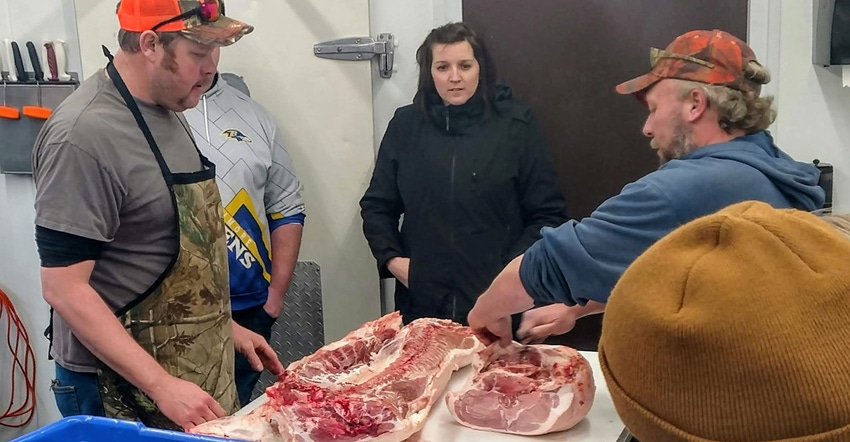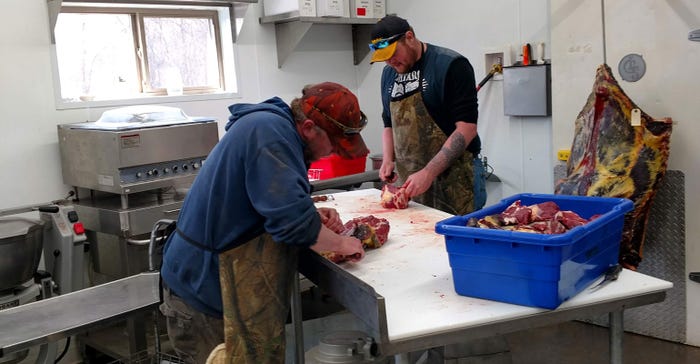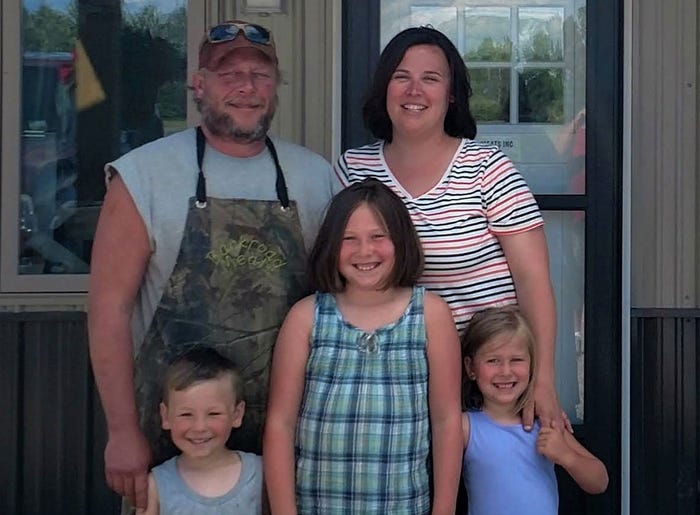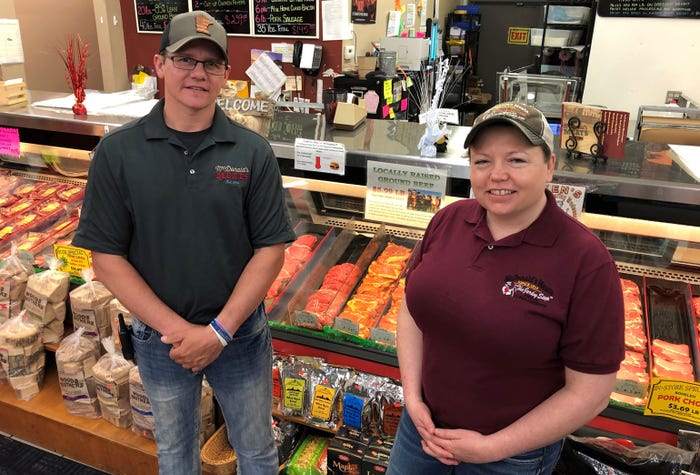June 30, 2020

Local meat processors are working overtime these days to provide butchering services for livestock and poultry farmers impacted by large processing plant closures due to workers testing positive for COVID-19.
The pandemic caused large plants, such as Smithfield Foods in Sioux Falls, S.D., and JBS in Worthington, Minn., to shut down and then reopen with fewer employees and less capacity. Farmers scrambled to find slaughter plants, reaching out to small processors. These smaller businesses typically slaughter 30 or less animals per day and were already booked, but they added hours and employees — when possible — to squeeze in extra animals, especially from hog producers who needed to sell or euthanize.
The Minnesota Department of Agriculture also scrambled, with matching grants for equipment and a fast track program, to help custom processors meet regulations to slaughter more animals and sell products. The goal is to have enough processors to meet consumer demand now and in the future.
Booming market
Rob and Amanda Isaacson, Milaca, know how licensing has changed.
In 2017, Rob decided to quit trucking and open a custom processing shop, based on his experience as a teen working at a meat locker. It took until Dec. 22, 2019, to get all the permits and build a 30-by-48-foot facility on their property to open Backroad Meats Inc.
As a licensed custom shop, they were not allowed to sell meat, just slaughter and process meat for customers. The year started out well, Amanda says, then slowed enough in March that Josh Holm, who is working his way into the partnership, found another job.
It lasted five days.
 OVERTIME: Increased demand has Rob Isaacson (left) and Josh Holm (right) working overtime at Backroad Meats in Milaca, which opened in December 2019.
OVERTIME: Increased demand has Rob Isaacson (left) and Josh Holm (right) working overtime at Backroad Meats in Milaca, which opened in December 2019.

When hog processing plants closed in early April due to its workforce impacted by COVID-19, Backroad Meats’ phone started ringing. Besides orders to pick up and process hogs from hobby farmers, three large producers each scheduled 10 hogs per week for six weeks. With a Facebook post, Amanda helped connect them with people from the Twin Cities interested in buying half and whole hogs.
“When we started, we were planning on four hogs and six beef a week,” she says. “But now we do 14 hogs and four beef a week [on Thursdays with an inspector.] It’s the maximum with the equipment we have and with two butchers and a wrapper.”
When Jennifer Dierkes of McDonald’s Meats, Clear Lake, told them about a new MDA program, the trio pursued it, despite the overtime they were already putting in. With Equal To licensing, they can sell meat to customers. Instead of taking up to half a year, the fast track program helps processors get started in one to three weeks.
MDA fast track
“Our role is to provide inspections for small processing plants in the state that serve local farmers,” says Levi Muhl, program manager for MDA’s Meat, Poultry, Egg Inspection. Of the state’s approximate 300 processors, only 53 were in the Equal To program at the beginning of the year.
To help processors get Equal To inspection faster, the agency provides templates to create plans for safe processing and cleaning equipment requirements. With Equal To, processors can wholesale meat in Minnesota. Currently they certified six new processors. If the trend continues, there may be a dozen certified this year.
“As a state, there is a surplus of hogs all over and backlogs at our small processors continue. If we can increase the marketability, we can increase slaughter capacity as a whole. Our theory is any animal we save is one less animal that will be underutilized and euthanized,” Muhl says. “We are here to help the famers and processors alike.”
MDA also offered matching grants up to $5,000 to increase slaughter and processing capacity. That program, however, expired June 15. Most processors used the grants for specific equipment.
“Cooler space is the No. 1 equipment purchase,” Muhl says. “No. 2 is processing equipment.”
 FAMILY BUSINESS: Isaacson, a former trucker, appreciates working closer to home to be with his wife, Amanda, and their three children, Wyatt (front, left), Samantha and Alyssa.
FAMILY BUSINESS: Isaacson, a former trucker, appreciates working closer to home to be with his wife, Amanda, and their three children, Wyatt (front, left), Samantha and Alyssa.

Backroads Meats used a grant to buy a vacuum machine tumbler that speeds up the curing process.
“Instead of seven days, we can brine cure overnight,” Amanda says.
Although limited in what they can handle with their smoker and freezer space, Backroads Meats plans to sell bacon and burger to local restaurants and stores and sell “weekender packages” online for consumers heading up north.
“We didn’t want to get stuck on doing just custom work,” Amanda says. “Now that we are getting help to move along to the next step, it opens up more doors and the ability to branch out.”
Room for more
Dierkes and Travis and Dave McDonald are third- and fourth-generation owners of McDonald’s Meats. There’s a need for small processors, Dierkes says, so she is glad to see businesses such as Backroad Meats expand. McDonald’s Meats has been USDA-certified — federally inspected allowing national sales—since the 1970s and expanded its 6,600-square feet facility in 2017 by adding 16,000 square feet.
“If we hadn’t done the addition, we would have been overwhelmed,” she says. “We had to ramp up all areas of the business and have 40 people, full and part-time.”
When grocery store meat shelves were bare, many consumers rediscovered local processors, Dierkes says. She had beef purchased from local farmers and didn’t have to raise prices.
“With the pandemic, demand went up substantially for our butchering services. We could have butchered every day, but we only have so much space,” she says. “We increased business by 25% across the board.”
Previously, they scheduled slaughter dates seven to eight months ahead. Now it’s more than a year in advance.
 MORE SMALL BUSINESSES NEEDED: Jennifer Dierkes and Travis McDonald with McDonald’s Meats, Clear Lake, are glad to see more consumers buying meat products from smaller processors.
MORE SMALL BUSINESSES NEEDED: Jennifer Dierkes and Travis McDonald with McDonald’s Meats, Clear Lake, are glad to see more consumers buying meat products from smaller processors.

Consumers learned they can save money buying in bulk, so Dierkes is optimistic they will continue to shop locally, even after the pandemic subsides. Consumers recognize quality and service from business owners who love what they do. There’s science involved in meat processing, ranging from slaughter to finished product that combines the perfect combination of fat, spices and smoking to create prize-winning specialty meats, she adds.
To help farmers and processors find each other, MDA offers a map and directory on its website. It also offers Agriculture Growth, Research, and Innovation Value-Added grants to help producers and entrepreneurs start their own processing businesses.
Amanda notes that she also feels like a matchmaker, connecting producers with consumers who want to buy meat.
“The more I can help them, it helps us out, too. And they get a great product,” she says. “We grew way faster than we anticipated. But it’s a good busy.”
Goerge writes from Parkers Prairie.
You May Also Like




